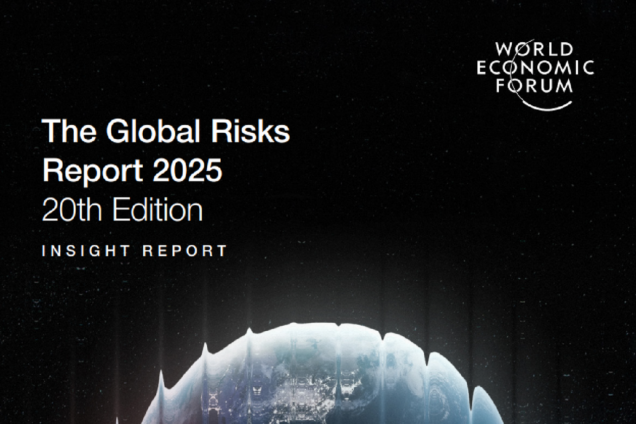“Optimism is limited as the danger of miscalculation or misjudgment by political and military actors is high,” 2025 Global Risks report has said.
The report released by the World Economic Forum indicates that the world appears to be experiencing one of its most divided periods since the Cold War, with this division reflected in a concerning outlook across all three-time frames – present, short-term, and long-term.
According to the report, a majority of respondents (52%) expect an unstable global outlook over the short term (next two years), similar to last year’s figures. 31% foresee turbulence and 5% anticipate a stormy outlook.
When combining these three categories, there is a four-percentage-point increase from the previous year, reflecting a more pessimistic view of the world through 2027. In contrast, the 10-year outlook worsens further, with 62% of respondents predicting turbulent or stormy conditions.
“This long-term outlook has remained similar to the survey results last year, in terms of its level of negativity, reflecting respondent skepticism that current societal mechanisms and governing institutions are capable of navigating and mending the fragility generated by the risks we face today,” the report stated.
When comparing this year’s findings for the world in 2025 with the two-year risk outlook provided by the GRPS two years ago, the report stated that, it's evident that perceptions have become significantly more pessimistic, particularly regarding conflict. "State-based armed conflict, now ranked as the number 1 current risk by 23% of respondents, was overlooked as a leading two-year risk two years ago."
"Supercharged Economic Tensions" delves into the potential evolution of global geoeconomic conflicts. The increased ranking of Geoeconomic confrontation, moving from number 14 last year to number 9 this year, highlights growing concerns about the future of international economic relations. Respondents are also increasingly worried about the role of technology in geopolitical conflicts, with Cyber espionage and warfare now ranked number 5 in the two-year outlook.
Another concern highlighted in the report is societal divisions, which are key to the overall risk landscape. It states that inequality—particularly in wealth and income—is seen as the most significant risk, as it both contributes to and is affected by other risks. This growing inequality is eroding trust and reducing the global sense of shared values.
“As well as Inequality, other societal risks also feature in the top 10 of the two-year ranking: Societal polarization, involuntary migration or displacement and Erosion of human rights and/ or civic freedoms. The importance ascribed to this set of societal risks by respondents suggests that social stability will be fragile over the next two years.”
Concerns among respondents regarding key economic risks, such as an economic downturn and inflation, have decreased compared to last year, with these two risks seeing the most significant drops in the two-year ranking. However, the ongoing cost-of-living crisis since 2022 has led to inequality emerging as the top interconnected risk this year. Respondents in the GRPS survey identified economic downturn, inflation, and debt as the primary contributors to inequality.
“Although there are fewer societal risks in the top 10 of the 10-year risk ranking than in the top 10 of the two-year risk ranking (two compared to four, see Figure C), the profound societal fractures that feature prominently in this report should not be perceived as solely short-term risks. Looking ahead to the next decade, Inequality and Societal polarization continue to feature among the top 10 risks.
This is an important pair of risks to watch, given how related they can be to bouts of social instability, and in turn to domestic political and to geostrategic volatility. In super-ageing societies – such as Japan, South Korea, Italy or Germany – unfavourable demographic trends could accentuate these risks over the next 10 years. Pensions crises and labour shortages in the long-term care sector are likely to become acute and widespread problems in super-ageing societies, with no easy fix for governments.”
Latest Stories
-
Crystal Palace beat Fulham to book FA Cup semi-final spot
2 hours -
Forest beat Brighton on penalties to reach FA Cup semi-final
2 hours -
MTN FA Cup 2024/25: Berekum Chelsea book semis slot with win over Bechem United
2 hours -
Gov’t promoting galamsey with GoldBod; the GoldBod is galamsey board – Minority
3 hours -
Ghana Navy probes suspected pirate attack on fishing vessel
3 hours -
2024/25 FA Cup: Attram De Visser stuns PAC Academy to reach first-ever semifinal
4 hours -
‘Shocking and excessive’ – Lawyer challenges $18m verdict in Anas-Kennedy Agyapong case
6 hours -
Parliament approves GH₵2.8bn for road maintenance
6 hours -
Minority Chief Whip raises concerns over ambiguities in Gold Board bill
7 hours -
Mahama warns leaders against ‘decisions that kill’ after debt crisis claims lives
7 hours -
Wisconsin Attorney General sues to block Elon Musk $2m election giveaway
7 hours -
Disney faces US investigation over DEI practices
7 hours -
Hair relaxers linked to increased breast cancer risk in Ghanaian women
7 hours -
Columbia University president resigns amid Trump crackdown
7 hours -
CJ removal petition: Citizens must not sit back and watch politicians to get their way – NPP MP
7 hours

